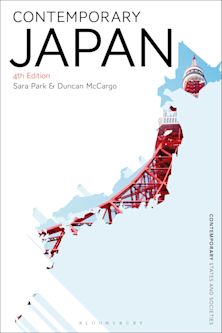- Home
- ACADEMIC
- Politics & International Relations
- Asian Politics
- Japan’s Quiet Leadership
This product is usually dispatched within 1 week
- Delivery and returns info
-
Free CA delivery on orders $40 or over
You must sign in to add this item to your wishlist. Please sign in or create an account
Description
Why has Japan emerged from the “lost decades” unscathed from the populist wave and a far more consequential actor in the geopolitics of the Indo-Pacific? In answering this question, Japan’s Quiet Leadership provides a sweeping look at Japan’s domestic economic and political evolution, its economic statecraft, and the array of geopolitical challenges that have triggered a gradual but substantial shift in the country’s security profile. This deep dive into Japan’s trajectory over the last three decades underscores Japan’s hidden strengths in its democratic resilience, social stability, and proactive diplomacy; while reckoning with the profound challenges the nation faces: depopulation, rising inequality, voter disengagement, and threats to Asia’s long peace. The book traces the profound currents of change coursing through the Japanese polity and its external environment; and the myriad ways in which Japan’s experience has become more relevant to countries coping with slow growth, adverse demographics, adjustment to economic globalization, and the emergence of a powerful and assertive China.
This is a story of Japan’s reinvention as a network power to overcome the harsh realities of diminishing relative capabilities. In reshaping the Indo-Pacific, Tokyo deployed a robust economic strategy of trade integration and infrastructure finance; and a proactive security diplomacy cultivating new partnerships with regional and extra-regional actors and deepening the alliance with the United States. Nevertheless, acute geopolitical rifts, Japan’s pandemic insularity, and the securitization of international economic relations are testing Japan’s statecraft of connectivity. The tasks at home are no less pressing: delivering on the green, digital, and human capital transformations, avoiding the return of the politics of indecision at the helm of the nation, and fostering democratic dynamism. This book illuminates where the Japanese polity, economy, and people are heading as we move past the Abe era, and well into the 2020s and beyond.
Table of Contents
Section 1. Globalization
Chapter 1: Stability amid Economic Globalization
Chapter 2: Foreign Workers: Breaking Taboos, Closing Borders
Section 2. Economics
Chapter 3: What Went Wrong (and Right) in the Lost Decades?
Chapter 4: Enter Abenomics
Chapter 5: The Quest for Revitalization: How Fares the Middle-Class Society?
Section 3. Politics
Chapter 6: Change and Continuity in Japanese Politics
Chapter 7: Japan’s Democracy in the Populist Era
Section 4. Geoeconomics
Chapter 8: Champion of Connectivity in a Rules-Based Order
Chapter 9: The Hard Edge of Japanese Economic Statecraft
Section 5. Geopolitics
Chapter 10: Growing Pains of a Nascent Security Role
Chapter 11: A More Capable Japan: Assessing Abe’s Legacy
Chapter 12: Taming a Hobbesian World? Japan’s sharper security choices
Conclusion: A Network Power in a Divided World
Product details
| Published | Aug 24 2023 |
|---|---|
| Format | Hardback |
| Edition | 1st |
| Extent | 260 |
| ISBN | 9780815740261 |
| Imprint | Brookings Institution Press |
| Illustrations | 22 b/w illustrations |
| Dimensions | 236 x 158 mm |
| Publisher | Bloomsbury Publishing |
About the contributors
Reviews
-
This volumeprovides incisive analyses of the social, political, and economic factors influencing Japan’s rising profile in the Indo-Pacific. Solís offers compelling evidence that the oft-cited narrative of Japan’s stagnation is to a large degree a thing of the past. Solís also explores how Japan’s reemergence as a significant actor provides a model for a variety of states experiencing the same mix of negative societal, economic, and political factors that contributed to Japan’s initial decline in influence. The significant domestic factors Solís cites that contribute to Japan's rise include the decisive, extended leadership of Shinzo Abe and his ability to overcome bureaucratic inertia in the country's domestic and international policies, which reshaped both Japanese politics and the popular reluctance to assume enhanced security arrangements in Asia. Solís also traces Japan’s successful, active reshaping role in shifting international frameworks, including enhanced security threats in Asia and the reluctance of the United States to take an active role in reshaping Asian economics through participation in the Trans-Pacific Partnership. An insightful book. Recommended. Undergraduates through faculty; professionals.
Choice Reviews
-
In her judicious survey of Japan’s economics and politics over the last three decades, Solís argues that the country has left stagnation behind to emerge as a regional “network power par excellence.”
Foreign Affairs
-
For years many in the foreign policy community worshipped at the altar of China. China was to be the future. However, Dr. Solis saw clearly that our future rested on alliances, chief among them, with Japan. She masterfully dissects the statecraft, economic agility and political evolution which has allowed Japan to reshape the Indo-Pacific and her role in it. As Japan had to deal with demographic change, a different security atmosphere, and declining relative capabilities not to mention pandemic, Dr. Solis’ effort can provide the template for other nations facing similar challenges. This should be the text book for a new generation of foreign policy thinkers.
Richard Armitage, former Assistant Secretary of Defense and former Deputy Secretary of State
-
In Japan’s Quiet Leadership, Mireya Solis offers invaluable insights into the emergence of Japan from its “lost decades” to becoming a trend setter and rule maker on the international stage. She colorfully navigates this thirty- year transformation, leaving the reader with a deep appreciation of the complexities involved in Tokyo re-inventing itself. To better understand how Japan has managed to step up its game internationally at a time of global uncertainty and rising nationalism in many corners of the world, this book is a must read.
Wendy Cutler, Vice President of the Asia Policy Institute, former deputy assistant U.S. Trade Representative
-
Japan's Quiet Leadership: Reshaping the Indo-Pacific acutely captures the geopolitical sea change that evolutionized Japan's politics and economy to its position in the region today. Demonstrating her intricate knowledge as a Japan hand and authority on trade with her keen eye of the country's domestic political dynamics, Solis depicts a compelling case of the late Prime Minister Abe's leadership in repositioning and reimagining Japan and its significance today - a testament to his legacy holding strong in years to come.
Funabashi Yoichi, Chairman of the Global Council of the International House of Japan, former editor-in-chief of the Asahi Shimbun
-
Past studies of Japan’s relevance as a global and regional actor have often focused on contradictions, whether tensions between the country’s success as a fast-growth economy in the 1960s and 1970s and its lost decades of relative economic stagnation after the 1990s,or the apparent historic unwillingness of its public or leaders to shape the international order. Mireya Solis’s timely study challenges these familiar narratives with a picture of a much more engaged and effective government. Far from dominated by sclerotic institutions or risk aversion, Japan under Fumio Kishida (and predecessors, most notably the late Shinzo Abe) is becoming a far more influential actor. In four key respects — resistance to populist politics; ability to develop strong executive decision-making; promotion of network diplomacy, and ability to take the lead bilaterally, multilaterally and in key institutions such as the G20 and G7 — Japan’s influence compensates for the weaknesses and introspective tendencies of other states, including, strikingly, the US. Yes, Japan faces major challenges, including demographic pressures, limits to immigration, high domestic debt, popular disengagement from politics and threats from authoritarian states, particularly China. Nonetheless, its experience provides numerous past and present lessons (eloquently described in Solis’s comprehensive analysis) for other states on how to adapt to today’s geostrategic and geoeconomic pressures.
Journal Global Asia


































